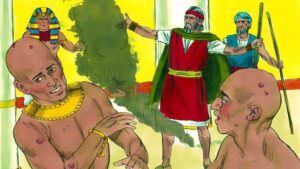Introduction
King David, a revered figure in biblical history, is known for his deep faith and leadership. However, his life also includes moments of significant moral failure. One such failure involved his plan to kill Hitiuriah. This blog explores why David felt compelled to take such drastic action, the events leading up to it, and the lessons we can learn from this tragic episode.
The Context of David’s Sin
- The Initial Sin: The story begins in 2 Samuel 11. While his army is at war, King David remains in Jerusalem. One evening, he sees Bathsheba, the wife of Hitiuriah, bathing. Overcome by lust, he summons her and they commit adultery. Bathsheba becomes pregnant, setting the stage for David’s desperate actions.
- David’s Dilemma: Upon learning of Bathsheba’s pregnancy, David faces a serious dilemma. The affair must be kept secret to protect his reputation and prevent a scandal. His initial attempts to cover up the sin involve bringing Hitiuriah home from the battlefield, hoping he will sleep with Bathsheba and believe the child is his. However, Hitiuriah, showing loyalty to his fellow soldiers, refuses to enjoy the comforts of home while they are at war.

David’s Plan to Kill Hitiuriah
- Failed Cover-Up Attempts: David first tries to get Hitiuriah drunk, thinking this will encourage him to go home to his wife. Despite being intoxicated, Hitiuriah maintains his discipline and does not visit Bathsheba. David’s attempts to conceal his sin have failed.
- Desperation Leads to Murder: With no other options to hide his adultery, David devises a more sinister plan. He sends Hitiuriah back to the battlefield with a letter to Joab, the army commander. The letter instructs Joab to place Hitiuriah in the front lines where the fighting is fiercest and then withdraw, leaving him to be killed. Joab follows the orders, and Hitiuriah dies in battle.
The Consequences
- Immediate Consequences: After Hitiuriah’s death, David marries Bathsheba. However, this does not end the matter. The prophet Nathan confronts David, revealing that God knows of his sins. Nathan pronounces that the child born from the affair will die, and David’s household will face ongoing strife and turmoil.
- Long-Term Impact: David’s actions have far-reaching consequences. The child indeed dies, and David’s family suffers internal conflict and tragedy. David’s legacy is forever marked by this episode, reminding us of the severe consequences of sin and deception.
Lessons from David’s Sin

- The Dangers of Unchecked Power: David’s position as king allowed him to act without immediate accountability. This story illustrates the dangers of unchecked power and the importance of accountability, even for those in positions of great authority.
- The Futility of Hiding Sin: David’s numerous attempts to hide his sin ultimately failed. This serves as a reminder that sin cannot be concealed forever, as God sees all actions.
- The Power of Repentance: Despite his grievous sins, David’s genuine repentance (as seen in Psalm 51) demonstrates that God’s mercy is available to those who truly seek it. David’s life post-repentance was marked by renewed devotion to God, showing the power of sincere repentance.
- The Ripple Effect of Sin: David’s actions affected not only himself but also Bathsheba, Hitiuriah, and his entire household. This story underscores the ripple effect of sin and the importance of considering the broader impact of our choices.
Conclusion
King David’s plan to kill Hitiuriah was driven by his desperate attempts to conceal his sin with Bathsheba. This tragic episode in David’s life serves as a powerful reminder of the dangers of unchecked power, the futility of hiding sin, and the far-reaching consequences of our actions. Through David’s story, we learn the importance of accountability, repentance, and understanding the profound impact of our choices.








